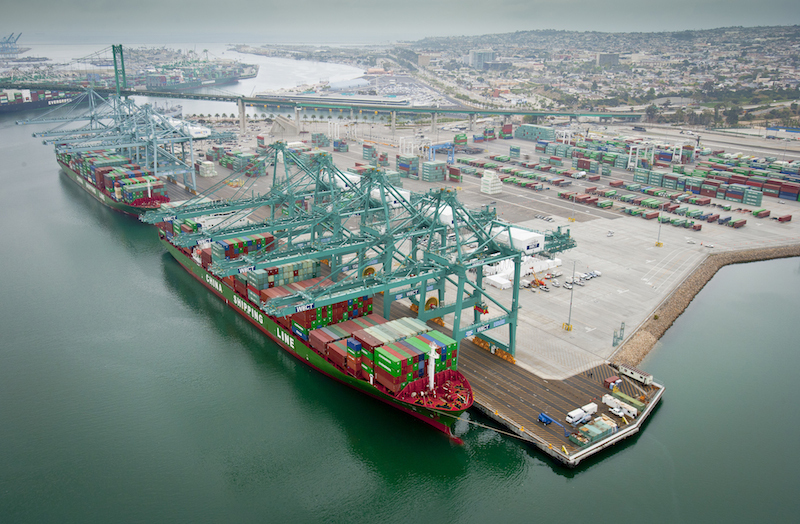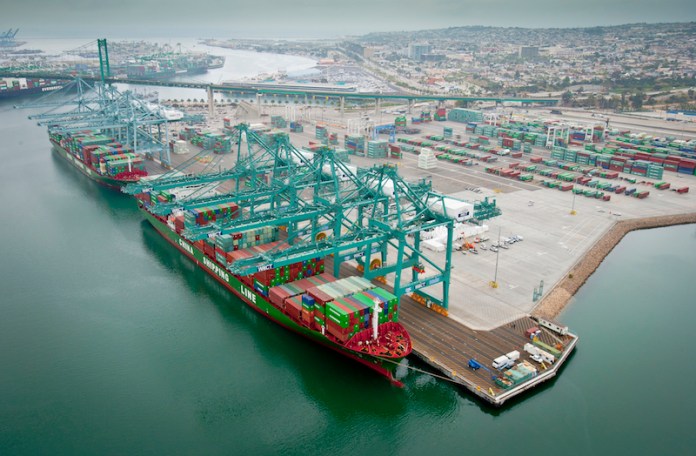The Port of Los Angeles violated the law with its most recent plans to mitigate harm from the China Shipping terminal, a judge ruled on June 27. Judge Timothy Taylor ordered the port and the City of LA to “set aside the August 2020 certification of the SEIR [supplemental environmental impact report],” which involved replacement mitigations for 11 measures in the 2008 EIR that were never implemented.
“The port violated CEQA [the California Environmental Quality Act] in several ways by certifying the SEIR in August of 2020,” Judge Taylor wrote. Crucially, “The critical assumption underlying the SEIR’s environmental analysis — i.e., that China Shipping would agree to amend its lease in 2019 to require mitigation — is completely baseless,” which in turn “renders even the port’s watered-down mitigation measures unenforceable.”
Advertisement
The port was justified in eliminating some measures as infeasible, but not others, he also ruled, and he declined to pursue a specific remedy. “The court may not direct the port to carry out its obligations under CEQA in any particular way,” he wrote.
Homeowners represented by the Natural Resources Defense Counsel (NRDC) filed the initial China Shipping lawsuit in 2001 when the port approved the project without any EIR at all. They won on appeal in 2003, leading to the 2008 EIR. This lawsuit was notable because homeowners and activist organizations were joined by both state and regional air pollution agencies — CARB (California Air Resources Board) and the AQMD (South Coast Air Quality Management District) — as well as the Attorney General.
“The forceful words from this judge’s decision underscored the port’s repeated failures to comply with environmental laws or to respect the health impacts to residents from their industrial expansion,” said Janet Gunter, one of three local activists who spearheaded the initial lawsuit.
“This decision is a victory for the port-adjacent communities in Los Angeles,” said CARB Chair Liane Randolph. “The Port of Los Angeles must finally require China Shipping to set in place the required measures they have been flouting, and take steps to reduce the air pollution they produce that is harming the residents of multiple AB 617 communities.” Assembly bill 617 requires specific emission reduction protections for environmental justice communities, including Wilmington, Carson and west Long Beach.
“The judge understood the history of the port’s malfeasance in this case and I think that his ruling reflected that,” NRDC senior attorney David Pettit told Random Lengths News.
“This is another in a long line of court rulings finding the port has violated laws designed to protect public health and the environment,” said Joe Lyou, president and CEO of the Coalition for Clean Air, another community plaintiff represented by NRDC. “It says a lot about their continual prioritization of money over the health of their neighbors. It’s time for the city and port to make the systemic changes necessary to start making the health and welfare of the residents of Wilmington and San Pedro a higher priority than maximizing profits,” he said.
“The port has a 20-year record of flouting the law with this project, including issuing secret and illegal waivers of environmental protections to China Shipping. This took place at the highest levels of the port, perhaps the mayor’s office,” said Peter Warren of San Pedro and Peninsula Homeowners Coalition. “The port has shown that it cannot be trusted to follow CEQA, or to report honestly and transparently on mitigation compliance without independent oversight. This court victory is one step along the pathway to justice and accountability. As the court notes, the port allows and China shipping places priority on its profits ahead of ‘compliance with California environmental law and the health of harbor workers and residents.’ This must stop.”
While the judge warned in his ruling that “this court is only a temporary first port of call on the voyage to appellate review,” Pettit was not so sure that would happen, and the port itself has refused to comment. “While the Port of Los Angeles does not comment on ongoing litigation, the Port is evaluating its options in response to the Court’s ruling,” Port spokesman Phillip Sanfield said via email.
In addition to the central ruling striking down the SEIR, the judge also ruled on each implementation measure where the adequacy of the port’s analysis was challenged, upholding some while striking down others. For example, the port tried to weaken its AMP (shoreside power) requirement from 100% to 95% compliance, arguing that “some third-party vessels may not be equipped to use AMP, certain ‘situations’ may prevent an AMP-capable vessel from utilizing AMP, and 100% compliance has never occurred,” as the judge summarized. But, “These findings are not supported by substantial evidence,” he wrote, going on to explain how the original measure anticipated and allowed for precisely such difficulties. “The measure was unlawfully modified in violation of CEQA,” he concluded.
On the other hand, a similar reduction in compliance for vessel speed reduction (12 knots within 40 nautical miles of Point Fermin) was found to be “supported by substantial evidence” and was upheld. Perhaps most seriously, the court upheld the elimination of the drayage truck measure requiring a phased transition from diesel to LNG trucks, and the failure to adopt a replacement measure. As noted in the AQMD’s brief, this is strikingly at odds with the port’s own timeline of 2035 for 100% phase-in of zero-emission technologies.
All these could be challenged on appeal, but it could be months before it’s clear if there will be any. If there is none, what happens next is also unclear, particularly with a new mayor and new Harbor Commission coming in just a few months. When that happens, “there could be a different approach to this,” Pettit noted.
But Gunter was less optimistic.
“Our plaintiff’s celebratory mood regarding this second court win is tempered by the results of our first court victory,” she said. “If the port has proven anything at all, it is simply that they should not be trusted.”



